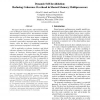Free Online Productivity Tools
i2Speak
i2Symbol
i2OCR
iTex2Img
iWeb2Print
iWeb2Shot
i2Type
iPdf2Split
iPdf2Merge
i2Bopomofo
i2Arabic
i2Style
i2Image
i2PDF
iLatex2Rtf
Sci2ools
161
click to vote
ISCA
1995
IEEE
1995
IEEE
Dynamic Self-Invalidation: Reducing Coherence Overhead in Shared-Memory Multiprocessors
This paper introduces dynamic self-invalidation (DSI), a new technique for reducing cache coherence overhead in shared-memory multiprocessors. DSI eliminates invalidation messages by having a processor automatically invalidate its local copy of a cache block before a conflicting access by another processor. Eliminating invalidation overhead is particularly important under sequential consistency, where the latency of invalidating outstanding copies can increase a program’s critical path. DSI is applicable to software, hardware, and hybrid coherence schemes. In this paper we evaluate DSI in the context of hardware directory-based write-invalidate coherence protocols. Our results show that DSI reduces execution time of a sequentially consistent full-map coherence protocol by as much as 41%. This is comparable to an implementation of weak consistency that uses a coalescing write-buffer to allow up to 16 outstanding requests for exclusive blocks. When used in conjunction with weak consi...
Cache Coherence Overhead | Coherence Protocol | DSI Eliminates Invalidation | Hardware | ISCA 1995 |
Related Content
| Added | 26 Aug 2010 |
| Updated | 26 Aug 2010 |
| Type | Conference |
| Year | 1995 |
| Where | ISCA |
| Authors | Alvin R. Lebeck, David A. Wood |
Comments (0)

